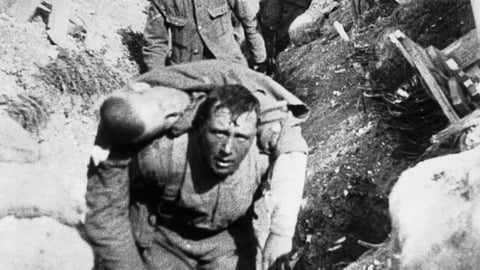World War I Lessons: War Is Hell
One lesson from World War I that mankind has learned over and over—and yet still doesn’t seem to understand: War is awful.

“War is hell.”
This phrase was coined by General William Tecumseh Sherman in reference to the American Civil War. The Civil War was one of the most bloody and destructive conflicts in history up to that point.
Unfortunately, the awfulness of the Civil War was overshadowed in brutality by the fighting methods employed in World War I: machine guns, poisonous gases, airplanes and barbed wire.
Awfulness of war
Many societies throughout human history have glorified war—Sparta, Rome, the Huns and even the United States (at times). War is often associated with glory, heroics, courage and legends—especially at the outset of a war. This is vividly shown in the beginning of the 1930 film All Quiet on the Western Front.
But after the soldiers experience battle, view gruesome bloodshed, lose friends or become severely injured themselves—that perception of glory quickly fades into reality. For more on the price of war, read our blog post “Why Is War Attractive?”
It is not just the soldiers who pay a price in war—although without a doubt they pay the highest price. The family and friends of soldiers deal with the pain of the loss of their loved ones. Those who live in the destructive path of war often have their homes, towns and cities destroyed. War refugees are often the forgotten victims of warfare.
The lesson shall be learned
The primary lesson of war in human history is that it always leads to enormous suffering and rarely solves the problems it was intended to solve.
In World War I, there were 37 million casualties. Over half of the men mobilized were either killed or injured. One would expect these sheer numbers would have stunned mankind into turning against war for good. The desire to forevermore resolve conflicts through diplomacy, not violence, was the impetus for the creation of the League of Nations. However, just two decades later, the world was caught up in an even more destructive war—World War II.
And since then we have seen countless smaller wars and conflicts around the globe. Though not as destructive as the World Wars in scope, the wars fought between 1945 and today have been just as devastating to those involved.
The primary lesson of war in human history is that it always leads to enormous suffering and rarely solves the problems it was intended to solve. Even when it resolves one issue, it typically creates a host of new challenges.
Mankind has refused to learn this vital lesson, but it will finally be learned.
Jesus Christ prophesied of a future time of warfare that would threaten all human life (Matthew 24:22). The fulfillment of this prophecy only became possible after the invention and stockpiling of nuclear weapons. More details of this future time are revealed in the book of Revelation. The scale of death and destruction of this future time is unimaginable (Revelation 9:15, 18).
The good news is that Jesus Christ will intervene (Revelation 19:11). He will not bring just a temporary, stop-gap effort toward peace; Jesus Christ will usher in an era of world peace—often called the Millennium (Revelation 20:4, 6).
Mankind has a wonderful future beyond the wars and tragedies of the past, present and future! Under the government of Jesus Christ, humanity will finally learn the vital lessons that World War I can teach us today—the importance of history, the value of life, the danger of greed and the awfulness of war.
Will we learn the lessons of history?
Or will we be among those whom George Santayana described as “condemned to repeat” the past?
This is the fourth article in a four part series on World War I Lessons. For the other articles in this series, see:
Read our blog post “Genocide Prevention in Five Words” to learn more about the biblical principle that would—and someday will—end all human conflict. Also, read our articles on the 10 Commandments for more details on these vital laws that lead to peace.
Date Posted: August 4, 2014



